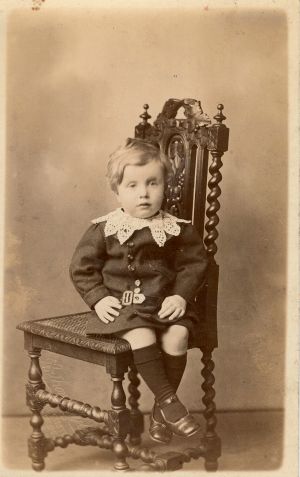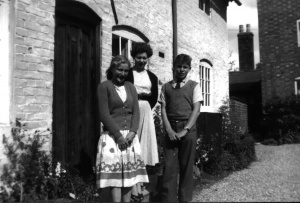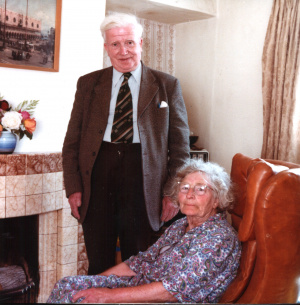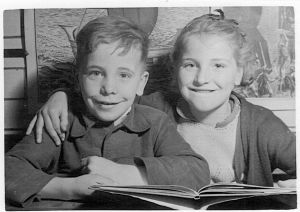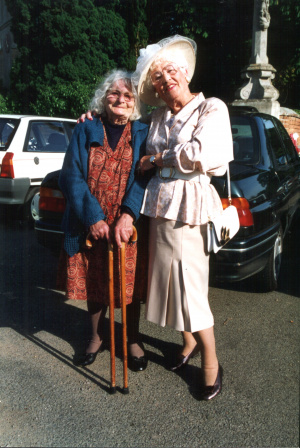Tenants at No 26: Difference between revisions
No edit summary |
No edit summary |
||
| Line 34: | Line 34: | ||
Then Phyllis came home and the family waited for her scold. There was a little scold from time to time when she couldn’t find anything but, on the whole, there was relief that it had all been cleared. Amongst all her economy drive to save everything she possibly could, was Phyllis’ need to salvage every bit of coal from the ashes of her range. Her savage raking of this fire each day; carrying out the ash with bits of coal and shaking these through a sieve so the bits of coal could be used again, had caused a heavy layer of black everywhere. Even the cobwebs in the ceiling (of which there were many – and ancient at that!) were covered in this sooty black. Now, at last, everything was clean. The sideboard and chest of drawers once completely hidden, were polished; the windows cleaned; curtains washed (only they fell apart so some of the nicer curtain material was used to make new ones), and the larder was cleared of old rusty tins of food. Those clearing the house had to work so carefully in the living room removing all the ‘treasures’. If any of it toppled over and landed on the floor, it would start a terrifying hissing noise from the larder. It was felt safer to dash outdoors and wait for the explosion, though it never came. As soon as it was felt safe, then the person would tiptoe in and peer round at the larder to see strawberry jam – or in one instance, treacle – dripping down the larder wall after a tin had exploded. One whole skip was needed to remove all the tins and jars and disintegrated coconut matting that had been stored in the larder for the last thirty years. |
Then Phyllis came home and the family waited for her scold. There was a little scold from time to time when she couldn’t find anything but, on the whole, there was relief that it had all been cleared. Amongst all her economy drive to save everything she possibly could, was Phyllis’ need to salvage every bit of coal from the ashes of her range. Her savage raking of this fire each day; carrying out the ash with bits of coal and shaking these through a sieve so the bits of coal could be used again, had caused a heavy layer of black everywhere. Even the cobwebs in the ceiling (of which there were many – and ancient at that!) were covered in this sooty black. Now, at last, everything was clean. The sideboard and chest of drawers once completely hidden, were polished; the windows cleaned; curtains washed (only they fell apart so some of the nicer curtain material was used to make new ones), and the larder was cleared of old rusty tins of food. Those clearing the house had to work so carefully in the living room removing all the ‘treasures’. If any of it toppled over and landed on the floor, it would start a terrifying hissing noise from the larder. It was felt safer to dash outdoors and wait for the explosion, though it never came. As soon as it was felt safe, then the person would tiptoe in and peer round at the larder to see strawberry jam – or in one instance, treacle – dripping down the larder wall after a tin had exploded. One whole skip was needed to remove all the tins and jars and disintegrated coconut matting that had been stored in the larder for the last thirty years. |
||
[[File:P03-Veronica_and_Lawrence_Salmon-2.jpg|thumb|left|Veronica and Lawrence Salmon]] |
|||
Phyllis had a sharp tongue and it was very upsetting to be at the receiving end of it, but in her heart was a desperate need to be loved and needed. She went out of her way to give people little gifts and glowed when they thanked her or praised her. She loved Betty Dench, for Betty understood her need and really cosseted her like a mother fussing over her sick child and seeing to her wants. Many others too realised her need and tried to give her the attention she needed. It was difficult, for the tiniest thing would upset her. Then she would walk along the village street crying and refusing to answer if anyone asked her what was wrong. This could last up to three weeks, and often the person at the receiving end didn’t even know what she had done to offend Phyllis in the first place. |
Phyllis had a sharp tongue and it was very upsetting to be at the receiving end of it, but in her heart was a desperate need to be loved and needed. She went out of her way to give people little gifts and glowed when they thanked her or praised her. She loved Betty Dench, for Betty understood her need and really cosseted her like a mother fussing over her sick child and seeing to her wants. Many others too realised her need and tried to give her the attention she needed. It was difficult, for the tiniest thing would upset her. Then she would walk along the village street crying and refusing to answer if anyone asked her what was wrong. This could last up to three weeks, and often the person at the receiving end didn’t even know what she had done to offend Phyllis in the first place. |
||
Latest revision as of 08:05, 2 October 2022
Mr. And Mrs. Rouse lived at No 26 in the 1920’s and their grandchildren were still living in the village years later; Cyril in charge of the village shop, and Hilda, who was a great friend of Betty Harris (then Betty Bailey). Mrs. Rouse was very thin, but she survived her husband by many years
Mr & Mrs Len Salmon
When she died, the Len and Phyllis Salmon moved in. They had been living at No 16, a two-bedroomed cottage with their two girls and one boy, so they were glad to move into a three-bedroomed house. However, Phyllis was a great believer in hoarding, not only all her own belongings, but other peoples’ too! These were ‘belongings’ her neighbours did not want and had therefore thrown then into their own dustbins. Phyllis went through the contents of their dustbins regularly and brought her ‘treasures’ home and stored them in her house, along with her ‘stuff’.
These ‘belongings’, to begin with, were all piled into the third bedroom of No 26, and it was years after they moved, before their son could move from the camp bed he had in his parents’ bedroom, into a bedroom of his own!
While her daughters were around, the house was kept reasonably habitable. Angela, her oldest daughter, was very adept, once her mother was out of the way, at whipping through her mother’s ‘treasure’ and stuffing them into a sack and disposing of them where her mother would never find them. When Angela and her sister Veronica married and left home, the ‘treasures’ began piling up
Then Lawrence, her son, married in 1973. At that time, there were chairs to sit on and some furniture was visible, but the girls’ bedroom no longer looked like a bedroom!. For one thing, there was no sign of the bed! It was hidden by ‘treasures’ heaped up on it. A lot of these ‘treasures’ were items Phyllis had bought at the market. Phyllis could not resist a bargain. She had to buy it, regardless of the fact that she had three or four identical items at home still with their wrapping on. What is more, when she did buy, the identical items in her house would be added to, to number eight – or ten – or twelve – or more!
When her little grandson died suddenly, Phyllis became ill and eventually had to have a pace-maker fitted. She convalesced at Veronica’s home in Bristol for many months. That is when Angela declared, “We’ve got to clear the downstairs to make a bed for her, for she will never make it up those steep stairs!”
By this time, in their living room, the chest of drawers and the sideboard were no longer visible, for the ‘treasures’ now reached to the ceiling The two little areas that Len and Phyllis placed themselves to sit and watch television (the only item of furniture that seemed to be clear of ‘treasures’) slowly, during the clearance, turned out to be large armchairs! The chair where Len sat to have his meal was noticeable, before the clearance started, as a chair. However, the small area where his plate was placed each meal, slowly opened up into a rather nice dining table. However, it took two afternoons to clear the ‘treasure’ underneath before a start could be made on the actual table!
In the kitchen, only the fridge door could be seen, plus the kitchen sink and draining board. The electric cooker had completely disappeared, for Phyllis believed in cooking on the kitchen range! As for the girls’ bedroom, their door wouldn’t even open due to all the ‘treasures’ that had been stuffed behind it.
And the ‘treasures’? The cotton sheets all in their wrapping, went off to Romania. There were over twenty of them – never used – and with the sale price still on them. So did the pillow cases too numerous to count, with the prices still on them. These were followed by dresses never worn and – yes – with the price on them (some of the prices in £.s.d) which also went to Romania. The crockery which never matched, went to a boot market. The good matching crockery went back into the girls’ bedroom to be shared amongst the family, and all the rest of the ‘treasures’ finished up in nine large skips. Before the skips were hired, the ‘treasures’ were stuffed into many dustbin bags which were piled into Lawrence’s car on daily trips lasting a fortnight, to the tip!
The family were uncertain what Phyllis’ reaction would be when she came home five months later. Len was thrilled with it all. At last he could walk down the stairs in the morning without knocking brown paper parcels down the stairs with a crash of crockery breaking! His greatest relief was to know he need no longer live in fear that he would follow the crockery down the stairs, finishing up with a broken leg!
All the bedding was stripped from both beds. Phyllis believed in keeping aired all the blankets and sheets for when they might be used again. Her ‘airing cupboard’ was the marital bed! Thirteen layers of bedding were taken off their bed before the mattress was found. This proved to be extremely hard and lumpy. A new mattress was bought. Some of Phyllis’ new sheets and blankets that had been kept, were put on their bed, and Len had his first good night’s sleep for years!
Underneath this bed were found box after box of Easter eggs – bargains of course! There were no Easter eggs left; just bits of silver wrapping and plenty of mice dirt!
Then Phyllis came home and the family waited for her scold. There was a little scold from time to time when she couldn’t find anything but, on the whole, there was relief that it had all been cleared. Amongst all her economy drive to save everything she possibly could, was Phyllis’ need to salvage every bit of coal from the ashes of her range. Her savage raking of this fire each day; carrying out the ash with bits of coal and shaking these through a sieve so the bits of coal could be used again, had caused a heavy layer of black everywhere. Even the cobwebs in the ceiling (of which there were many – and ancient at that!) were covered in this sooty black. Now, at last, everything was clean. The sideboard and chest of drawers once completely hidden, were polished; the windows cleaned; curtains washed (only they fell apart so some of the nicer curtain material was used to make new ones), and the larder was cleared of old rusty tins of food. Those clearing the house had to work so carefully in the living room removing all the ‘treasures’. If any of it toppled over and landed on the floor, it would start a terrifying hissing noise from the larder. It was felt safer to dash outdoors and wait for the explosion, though it never came. As soon as it was felt safe, then the person would tiptoe in and peer round at the larder to see strawberry jam – or in one instance, treacle – dripping down the larder wall after a tin had exploded. One whole skip was needed to remove all the tins and jars and disintegrated coconut matting that had been stored in the larder for the last thirty years.
Phyllis had a sharp tongue and it was very upsetting to be at the receiving end of it, but in her heart was a desperate need to be loved and needed. She went out of her way to give people little gifts and glowed when they thanked her or praised her. She loved Betty Dench, for Betty understood her need and really cosseted her like a mother fussing over her sick child and seeing to her wants. Many others too realised her need and tried to give her the attention she needed. It was difficult, for the tiniest thing would upset her. Then she would walk along the village street crying and refusing to answer if anyone asked her what was wrong. This could last up to three weeks, and often the person at the receiving end didn’t even know what she had done to offend Phyllis in the first place.
She adored her grandchildren (when they were not at an age to answer her back!) and was often seen taking her two youngest to the Old Dairy to watch the men working on the agricultural machinery. She also loved taking these two on the Charity bus to Stratford. Her shopping in Stratford only took half-an-hour. Since her pace-maker had been fitted, she had been walking with the aid of a stick, and half-an-hour with her stick (sometimes two sticks) was enough for her! She would finish up at Marks and Spencers where she could sit in a chair and chat to other customers while her two grandsons played on the escalator until the bus came, one and a half hours later.
As she was approaching her 87th birthday, she had a fall – not a nasty one, but an ambulance had to be called. It was a four-hour wait! Even she was relieved when it turned up, but in hospital, as the days went by, things didn’t go well and she died before Len could reach her. She left many memories, and all of them were fond ones, for those who knew her, understood her more than she thought they did. Ann Pybus summed it all up in a letter she wrote to the family from her new home. “I was so sorry to hear from Howard Wolverson of Mrs. Salmon’s death. I was so touched when she walked down with her sticks to say goodbye to me on the day we left Clifford.!”
Leonard William Salmon
Said at his Funeral Service at Clifford Chambers Church:
Len loved hymn singing. Whenever the Methodist Chapel on the main road had hymn-singing after their evening service, Len and his friends would leave the Church as soon as Evensong was finished, and dash round to the Methodist Chapel. There they would sing lustily the old Methodist hymns.
Len was baptised on Easter Sunday 1911 by the Rev. W. A. Pippet and he kept in his wallet right up until his death, the special hymn given to him as a baby for his baptism. Mrs. Rees-Mogg at the Manor was one of his God-parents.
He attended the village school under the very-much-feared Miss Wilding and his parents were very thrilled when he passed the entrance exam to the Stratford Grammar School. However, his Mother died soon after, and after two years spent at KES, he was told by his father that he was to leave and earn a living! The only job available was delivery boy at a grocery shop owned by Mr. F. Balance. From there, he would cycle to all the surrounding villages with a huge straw basket fastened to the front of his bike, stocked with groceries for his customers.
Saturdays were frantic for those working at Ballances, and all hands were needed, including those of the delivery boy. All goods, flour, sugar, dried fruit etc. were stored in sacks in the basement and had to be brought up to the shop floor. Everything had to be measured out and the quantities needed poured into square stacks of paper, which were then folded, tossed upwards and, with quick flicks of the wrist, were twisted into bags. Saturdays, Len worked late, sometimes up until almost midnight – especially at Christmas time. Consequently he missed out on all the village sporting activities. Occasionally he would have a holiday on a Saturday, and he would cross over the river to watch the village cricket. On light evenings, he would work on his allotment. Len loved his allotment and was heartbroken when the allotments were sold for building developments. (These building developments are now the houses in The Close!) From then on, he never picked up a spade again.
He was confirmed by the Rev. Hodgson, confirmation classes being held at No. 19, the white cottage opposite the Rec. He had regularly attended Sunday School, trotting with all the other children along the village street, across the main road and up the steep winding drive to Red Hill House to have lessons given by Miss Monica Pippet. Church attendance stopped however, once he started work. Though Mrs. Rees-Mogg expected all her tenants to attend the Church services, she did not demand it. Len did not regularly attend services again until he retired.
Len married Phyllis Allen on 7th November 1933 and moved from Manor Cottages where he was born, to No 16. Their family enlarged through the years: Angela in 1936 and 7 years later, twins, Lawrence and Veronica.
Due to leaving his motor bike engine running while adjusting the chain, he lost the tops off three of his fingers. When he was called up at the beginning of the 2nd World War, the Army quickly realised he would be unable to fire a gun. He was sent instead to the Orkneys where he transported Army Officers to and fro. His fondest recollection of those days was gathering on a Sunday night with the men and singing “The Old Rugged Cross”. After the War, it was back again to Ballances; this time getting orders ready for delivery. The little cottage at No 16 was ‘splitting at the seams’, so the family moved to No 26 in The Square where Len lived until his death.
Len became a member of the Working Mens Club joining the darts and dominoes teams. In 1964, Len took over the position of Treasurer to the Club, a position he held until the early 1990’s. He was very thrilled, on his retirement from this post, on being given a very special chair by the Club marked ‘Len’s Chair’. Woe betide anyone who dared to sit in that chair except himself from then on! The last few weeks of his life, that chair was often empty as he found it too tiring to come to the Club every evening, but he was there, every Wednesday night, for his Bingo – winning many prizes.
Grandchildren had come along and he was fully able to enjoy them once he retired from work. To the world around, he seemed to be quiet; rarely speaking; just sitting and watching and listening unless someone took the trouble to sit beside him and draw from him fascinating stories of his life. Then he would talk! To his grandchildren, he was a loving Grandad who would pick up any screaming grandchild, cuddle him and give him his bottle without any fuss; read favourite story books to the older ones; sing nursery rhymes with them, and help and encourage them to build snowmen. Dogs and cars he loved also – talking to them as if they were children. His love and gentleness was very apparent then. He was very proud of his 11 grandchildren, but was greatly torn with grief when one of his grandsons died suddenly at the age of 2 with a form of meningitis. By the time he died, 6 great grandchildren were added to the family – including twins!
He attended the Over 60’s and went regularly to their fortnightly meetings.
Hymn singing came back into his life in retirement. He enjoyed going to Sunday evening services just for the hymn-singing. Later, he found it more comfortable instead, to sit in his armchair on a Sunday evening and join in with singing hymns on Songs of Praise. He was always very satisfied and content when the Sunday morning service on television had hymns he could sing to, and would relate in great detail during lunch – and sometimes sing - every hymn he had sung that morning!
His favourite was always ‘The Old Rugged Cross’. During his short time in hospital, some of us attempted to sing it to him. Although unconscious and seemingly giving no awareness of his surroundings, his mouth moved constantly all through the hymn as though he was trying to sing the words.
When Phyllis died and he was alone in the house, he found rest and contentment talking to God. “I’ve had a lovely talk with God today,” he would often say. When unconscious, on the hospital bed, his mouth would sometimes move as if forming words that we could not hear.
There was no need for us to hear them. They were words – a confidential conversation – just between Len and his God.
